 |
Convert M4A to AIFF
|
M4A to AIFF Converter converts M4A files to
AIFF. The converter focuses on AIFF file that supports almost all codecs
in AIFF specification, for example, pcm 8-bit, pcm 16-bit, pcm 24-bit, pcm 32-bit,
pcm 32-bit float, pcm 64-bit float, a-Law, mu-Law, IEEE 754 float, ima4, gsm,
dwvw, and so on. The software also supports common file format such as AAC, M4A (MPEG-4 audio), M4R (iPhone ringtone), MP2, AMR, MP3, WMA, AWB,
etc. It could convert MPG to AMR, THD to AAC, ULAW to AAC, 3GP to MKA, FLV to AAC, WMA to AAC, and so on.
The software is very easy to use and supports batch conversion.
It is full compatible with 32-bit and 64-bit Windows 10/8/7/Vista/XP/2000.

What is M4A?
M4A stands for MPEG 4 Audio. Since MPEG-4 Part 14 is a container format, MPEG-4
files may contain any number of audio, video, and even subtitle streams, making
it impossible to determine the type of streams in an MPEG-4 file based on its
filename extension alone. In response, Apple Inc. started using and popularizing
the .m4a file extension. Software capable of audio/video playback should recognize
files with either .m4a or .mp4 file extensions, as would be expected, as there
are no file format differences between the two. Most software capable of creating
MPEG-4 audio will allow the user to choose the filename extension of the created
MPEG-4 files.
Because of its exceptional performance and quality, Advanced Audio Coding (AAC)
is at the core of the MPEG-4, 3GPP and 3GPP2 specifications and is the audio codec
of choice for Internet, wireless and digital broadcast arenas. AAC provides audio
encoding that compresses much more efficiently than older formats, such as MP3,
yet delivers quality rivaling that of uncompressed CD audio.
What is AIFF?
Audio Interchange File Format (AIFF) is an audio file format standard used for
storing sound data for personal computers and other electronic audio devices.
The format was co-developed by Apple Computer in 1988 based on Electronic Arts'
Interchange File Format (IFF, widely used on Amiga systems) and is most commonly
used on Apple Macintosh computer systems. AIFF is also used by Silicon Graphics
Incorporated. The audio data in a standard AIFF file is uncompressed big-endian
pulse-code modulation (PCM). There is also a compressed variant of AIFF known
as AIFF-C or AIFC, with various defined compression codecs.
Standard AIFF is a leading format (along with SDII and WAV) used by professional-level
audio and video applications, and unlike the better-known lossy MP3 format, it
is non-compressed (which aids rapid streaming of multiple audio files from disk
to the application), and lossless. Like any non-compressed, lossless format, it
uses much more disk space than MP3¡ªabout 10MB for one minute of stereo
audio at a sample rate of 44.1 kHz and a sample size of 16 bits. In addition to
audio data, AIFF can include loop point data and the musical note of a sample,
for use by hardware samplers and musical applications.
The file extension for the standard AIFF format is .aiff or .aif. For the compressed
variants it is supposed to be .aifc, but .aiff or .aif are accepted as well by
audio applications supporting the format.
- Free Download
M4A to AIFF Converter
- Install the software by instructions
- Launch M4A to AIFF Converter
- Choose M4A Files
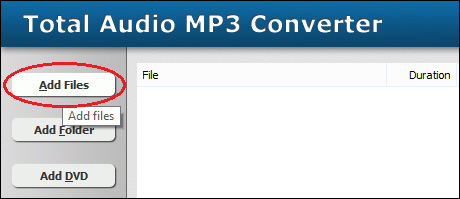
Click "Add Files" to choose M4A files and then add them
to conversion list.
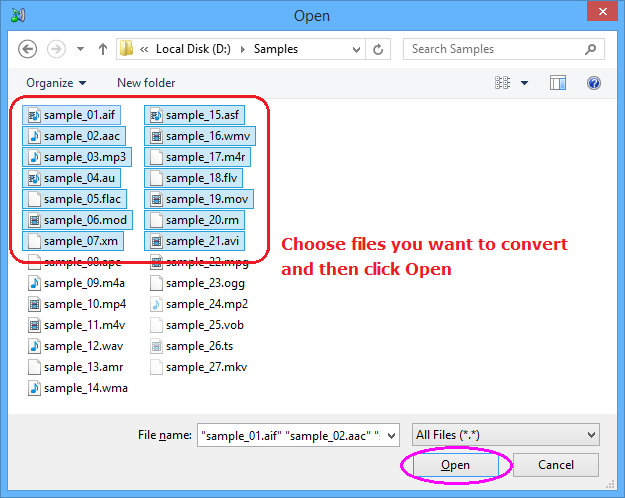
Choose one or more M4A files you want to convert and then click Open.
- Choose "to AIFF"
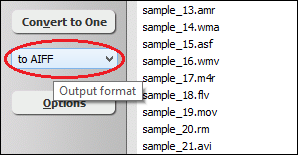
- Convert M4A to AIFF
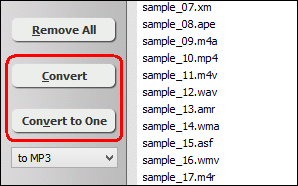
Click on "Convert" to convert M4A files to AIFF format; alternatively,
click on "Convert to One" to convert all files in list and
combine to a single one AIFF file.

The software is converting M4A files to AIFF format.
- Play and Browse AIFF File
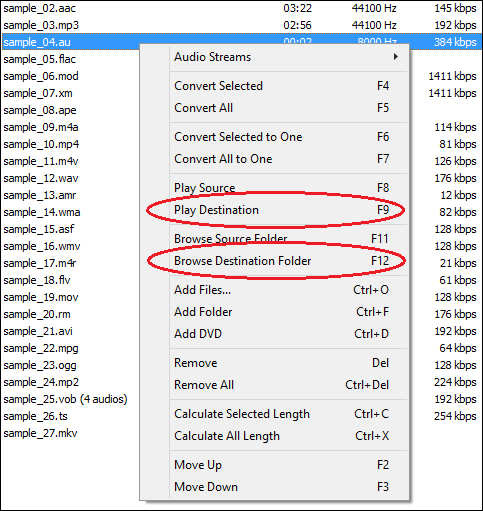
When conversion completes, you could right-click on converted file and choose
"Play Destination" to play the AIFF file; or choose "Browse
Destination Folder" to open Windows Explorer to browse the outputted AIFF
file.
Top
M4A to AIFF Converter is 100% clean and safe to install.
It's certified by major download sites.

M4A to AIFF Related Topics:
|

